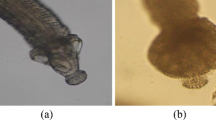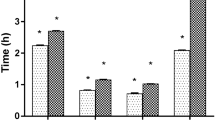Abstract
Strongyloides species is a helminth of worldwide distribution primarily in tropical and subtropical regions. It is the only soil-transmitted helminth with the ability for autoinfection so; it may lead to severe systemic manifestations especially in immunosuppressed patients. Chemotherapy is currently considered the best therapeutic option for strongyloidiasis but some drugs are expensive and others have side effects as nausea, diarrhea and headache. Strongyloides larva is resistant to most chemical agents so, search for plant extracts may provide other effective but less expensive treatment. Lawsonia inermis Linn, popularly known as Henna, has been proven to have antihelminthic, antibacterial and antifungal properties. The current study was carried out to evaluate the efficacy of Lawsonia inermis on Strongyloides spp. In vitro using scanning electron microscopy. Fifty Strongyloides species. larvae and free living females were incubated with different concentrations of Lawsonia (1, 10, 100 mg/ml), for different incubation periods (24, 48, 72 and 96 h) in comparison to the same concentrations of flubendazole at the same different time points. The results showed that Lawsonia inermis in a concentration of 10 mg/ml incubated with Strongyloides spp. female for 24 h affected the parasite cuticular surface in the form of transverse and longitudinal fissures and transverse depression in comparison to no cuticular change with flubendazole (100 mg/ml). This suggests that Lawsonia inermis may be a promising phytotherapeutic agent for strongyloidiasis.








Similar content being viewed by others
References
Akhtar MS, Iqbal Z, Khan MN, Lateef M (2000) Anthelmintic activity of medicinal plants with particular reference to their use in animals in Indo-Pakistan subcontinent. Small Rumin Res 38:99–107
Al-Arnaoutt S, Al-Jozieh IK (1987) Prophetic medicine. Risala Publishing, Beirut
Babili FE, Bouajila J, Valentin A, Chatelain C (2013) Lawsonia inermis: its anatomy and its antimalarial, antioxidant and human breast cancer cells MCF7 activities. Pharm Anal Acta 4:203
Bairagi GB, Kabra AO, Mandade RJ (2011) Anthelmintic activity of Lawsonia inermis L. Leaves in Indian Adult Earthworm 2:237–240
Basile A, Simzar S, Bentow J, Antelo F, Shitabata P, Peng SK, Craft N (2010) Disseminated Strongyloides stercoralis: hyperinfection during medical immunosuppression. J Am Acad Dermatol 63:896–902
Bisoffi Z, Buonfrate D, Angheben A, Boscolo M, Anselmi M, Marocco S, Monteiro G, Gobbo M, Bisoffi G, Gobbi F (2011) Randomized clinical trial on ivermectin versus thiabendazole for the treatment of strongyloidiasis. PLoSNegl Trop Dis 5(7):e1254
Chaudhary G, Goyal S, Poonia P (2010) Lawsonia inermis Linnaeus: a phytopharmacological review. Int J Pharm Sci Drug Res 2:91–98
Concha R, Harrington W Jr, Rogers AI (2005) Intestinal strongyloidiasis: recognition, management, and determinants of outcome. J Clin Gastroenterol 39:203–211
Dasgupta T, Rao AR, Yadava PK (2003) Modulatory effect of Henna leaf (Lawsonia inermis) on drug metabolising phase I and phase II enzymes, antioxidant enzymes, lipid peroxidation and chemically induced skin and forestomach papillomagenesis in mice. Mol Cell Biochem 245:11–22
Devi U, Borkakoty B, Mahanta J (2011) Strongyloidiasis in Assam, India: a community-based study. Trop Parasitol 1(1):30–32
Driscoll M, Dean E, Reilly E, Bergholz E, Chalfie M (1989) Genetic and molecular analysis of a Caenorhabditis elegans beta-tubulin that conveys benzimidazole sensitivity. J CeU Biol 109:2993–3003
Eguale T, Giday M (2009) In vitro anthelmintic activity of three medicinal plants against Haemonchus contortus. Inter J Green Pharm 1:29–34
El-Shazly AM, Awad SE, Sultan DM, Sadek GS, Khalil HH, Morsy TA (2006) Intestinal parasites in Dakahlia governorate, with different techniques in diagnosing protozoa. J Egypt Soc Parasitol 36(3):1023–1034
El-Sherbini G, Osman S (2013) Anthelmintic activity of unripe Mangifera indica L. (Mango) against Strongyloides stercoralis. Int J Curr Microbiol App Sci 2(5):401–409
El-Sherbini G, Abo El-Nooor M, Hegazy M (2008) Parasitosis in handicapped children on Egyptian blind asylum. J Egypt Soc Parasitol 38(1):319–326
Gilbert DN, Moellering RCJr, Eliopoulos GM, Chambers HF, Saag MS (2010) The sanford guide to antimicrobial therapy, 40th edn. Antimicrobial Therapy, Inc, Sperryville, p. 220
Goodman LS, Gilman A (2001) The pharmacological basis of therapeutics, 10th edn. Mcgraw Hill Medical Publishing Division, New York, p. 1121
Gupta AK (2003) Quality standards of Indian medicinal plants. Indian Counc Med Res 1:123–129
Hall A, Conway DJ, Anwar KS, Rahman ML (1994) Strongyloides stercoralis in an urban slum community in Bangladesh: factors independently associated with infection. Trans R Soc Trop Med Hyg 88:527–530
Harborne JB (1973) Phytochemical methods. Chapman and Hall, Ltd, London, pp 49–188
Heinrich M, Barnes J, Gibbons S, Williamson EM (2004) In: Fundamentals of pharmacognosy and phytotherapy: important natural products and phytomedicines in pharmacy and medicine. Elsevier Health Science, London
Horton J (2000) Albendazole: a review of anthelmintic efficacy and safety in humans. Parasitology 121(suppl):S113–S132
Jasra N, Sanyal SN, Khera S (1990) Effect of thiabendazole and fenbendazole on glucose uptake and carbohydrate metabolism in Trichuris globulosa. Vet Parasitol 35:201–209
Jeyathilakan N, Murali K, Anandaraj A, Abdul Basith S (2012) In vitro evaluation of anthelmintic property of ethno-veterinary plant extracts against the liver fluke Fasciola gigantica. J Parasit Dis 36:26–30
Keiser J, Shu-Hua X, Utzinger J (2006) Effect of tribendimidine on adult Echinostoma caproni harbored in mice, including scanning electron microscopic observations. J Parasitol 92:858–862
Khieu V, Schär F, Marti H, Sayasone S, Duong S, Muth S, Odermatt P (2013) Diagnosis, treatment and risk factors of Strongyloides stercoralis in school children in Cambodia. PLoSNegl Trop Dis 7(2):e2035
Kwa MS, Veenstra JG and Roos MH (1994): Benzirnidazole resistance in Haemonchus contortus is correlated with a conserved mutation at amino acid 200 in beta-tubulin isotype l. Mol Biochem Parasito1 63:299–303
Lacey E (1990) Mode of Action of Benzirnidazoles. Parasit Today 6:112–115
Lall N, Das Sarma M, Hazra B, Meyer JM (2003) Antimycobacterial activity of diospyrin derivatives and structural analogue of diospyrin against Mycobcterium tuberculosis in vitro. J Antimicrobial Chemother 51:435–438
Liu LX, Weller PF (1993) Strongyloidiasis and other intestinal nematode infections. Infect Dis Clin North Am 7:655–682
Nogueira PS, Martins FA, Duarte ER (2010) Effect of Anacardium humile on the larval development of gastrointestinal nematodes of sheep. Vet Parasitol 171:361–364
Nontasut P, Muennoo C, Sa-nguankiat S, Fongsri S, Vichit A (2005) Prevalence of strongyloides in Northern Thailand and treatment with ivermectin vs albendazole. Southeast Asian J Troph Med Public Health 36(2):442–444
Oliveira-Menezes A, Lins R, Norões J, Dreyer G, Lanfredi RM (2007) Comparative analysis of a chemotherapy effect on the cuticular surface of Wuchereria bancrofti adult worms in vivo. Parasitol Res 101:1311–1317
Olsen A, Van Lieshout L, Marti H, Polderman T, Polman K, Steinmann P, Stothard R, Thybo S, Verweij JJ, Magnussen P (2009) Strongyloidiasis—the most neglected of the neglected tropical diseases. Trans R Soc Trop Med Hyg 103:967–972
Osman AM, Rotteveel S, Den Besten OJ, Van Noort PC (2004) In vivo exposure of Dreissenapolymorphamussles to the quinines mendione and lawson. J Appl Toxicol 24(2):135–141
Ottesen EA, Duke BO, Karam M, Behbehani K (1997) Strategies and tools for the control/elimination of lymphatic filariasis. Bull World Health Organ 75:491–503
Prichard R (1994) Anthelmintic resistance. Vet Parasitol 54:259–268
Rahmoun NM, Boucherit-Otmani Z, Benabdallah M, Boucherit K, Villemin D, Choukchou-Braham N (2013) Antimicrobial activities of the henna extract and some synthetic naphthoquinones derivatives. Am J Med Biol Res 1:16–22
Raja W, Ovais M, Dubey A (2013) Phytochemical screening and antibacterial activity of Lawsonia inermis leaf extract. Int J Microbiol Res 4:33–36
Salem SA, Mohamed NH, Azab ME, Soffar SA, El Kadery AA, Sabry NM (1990) A survey for enteroparasites in Menoufia governorate, Egypt with special reference to Strongyloides stercoralis. J Egypt SocParasitol 20(1):335–344
Sarojini N, Chandra Kanti C, Priyanka J, UshaKumari S, Das MSD (2012) Correlation between the phytochemical constituents and anthelmintic activity of Lawsonia inermis leaf extracts. Int J Res Ayurveda Pharm 3:559
Sastri BN (1962) The wealth of India: raw materials, 6th edn, Vol. (L-M), CSIR, New Delhi, pp 47–50
Shaefler S (1989) Methicillin-resistant strains of Staphylococcus aureus resistant to quinolones. J Clin Microbiol 27(2):335–336
Shalit I, Berger SA, Gorea A, Frimerman H (1989) Widespread quinolone resistance among methicillin-resistant Staphylococcus aureus isolates in a general hospital. Antimicrob Agents Chemother 33(4):181–184
Shoukry Y (2011) scanning electron microscopy, a new approach of an old issue. EJH 34:179–181
Singh D, Swarnkar CP, Khan FA (2002) Anthelminthic resistance in gastrointestinal nematodes in livestock in India. J Vet Parasit 16:115–130
Singthong S, Intapan PM, Wongsaroji T, Maleewong W (2006) Randomized comparative trial of two high-dose albendazole regimens for uncomplicated human strongyloidiasis. Southeast Asian J Trop Med Public Health 37 (Suppl 3):32–34
Sultana N, Choudhary MI, Khan AJ (2009) Protein glycation inhibitory activities of Lawsonia inermis and its active principles. Enzyme Inhib Med Chem 24:257–261
Tippawangkosol P, Choochote W, Na-Bangchang K, Jitpakdi A, Pitasawat B, Riyong D (2004) The in vitro effect of albendazole, ivermectin, diethylcarbamazine, and their combinations against infective third-stage larvae of nocturnally subperiodic Brugia malayi (Narathiwat strain): scanning electron microscopy. J Vector Ecol 29:101–108
Trease GE, Evans WC (1989) Pharmacognsy, 11th edn. Macmillian Publishers, Brailliar Tiridel Can
Tripathi KD (2006) Essential of medical pharmacology, 4th edn. Jaypee Publication, New Delhi, pp 816–817
Vadlamudi RS, Chi DS, Krishnaswamy G (2006) Intestinal strongyloidiasis and hyperinfection syndrome. ClinMol Allergy 4:8
Valderrama JA, Leiva H, Rodriguez JA, Theoduloz C, Schmeda-Hirshmann G (2008) Studies on quinones. Part 43: Synthesis and cytotoxic evaluation of polyoxyethylenecontaining 1,4-naphthoquinones. Bioorg Med Chem 16:3687–3693
Author information
Authors and Affiliations
Corresponding author
Rights and permissions
About this article
Cite this article
Ismail, K.A., Ibrahim, A.N., Ahmed, M.AF. et al. Comparison between the effect of Lawsonia inermis and flubendazole on Strongyloides species using scanning electron microscopy. J Parasit Dis 40, 415–422 (2016). https://doi.org/10.1007/s12639-014-0519-2
Received:
Accepted:
Published:
Issue Date:
DOI: https://doi.org/10.1007/s12639-014-0519-2




